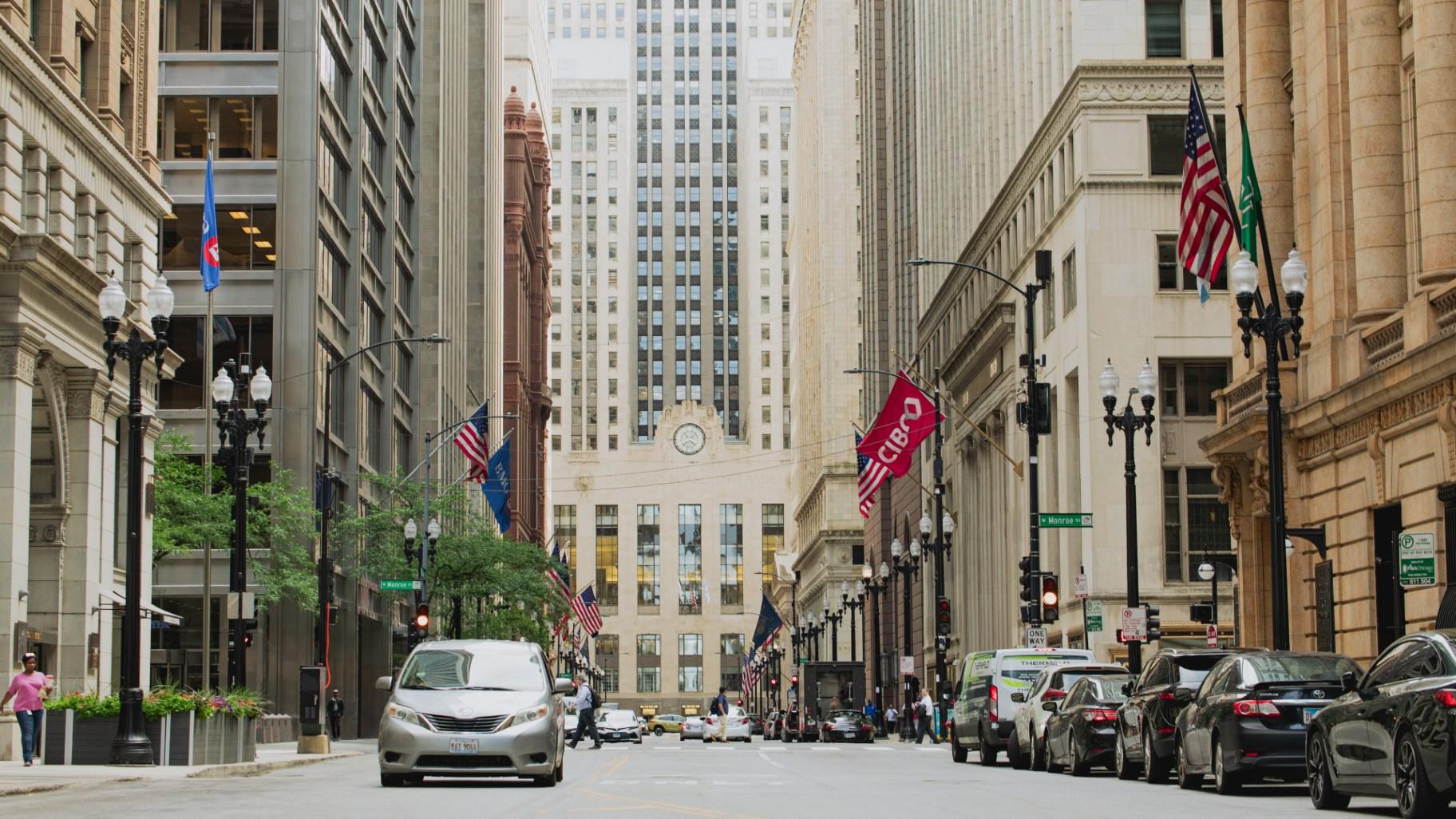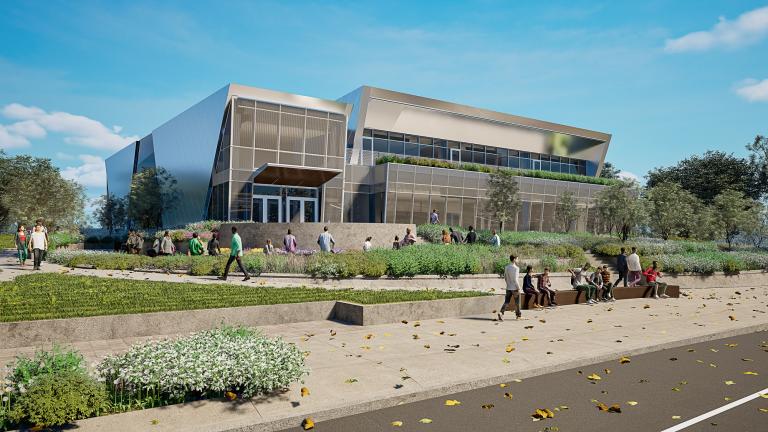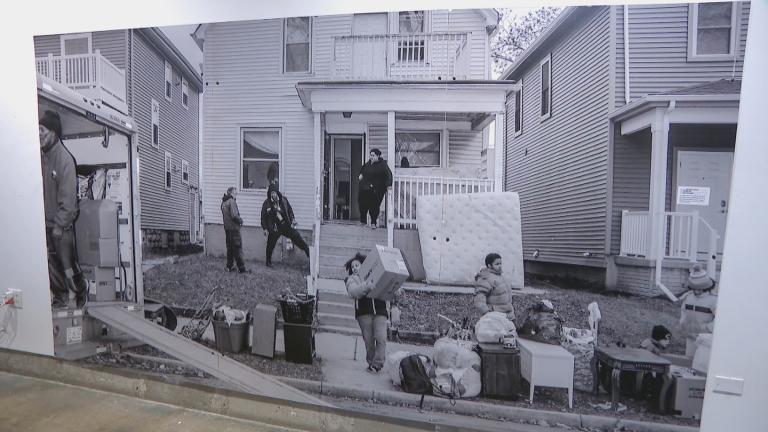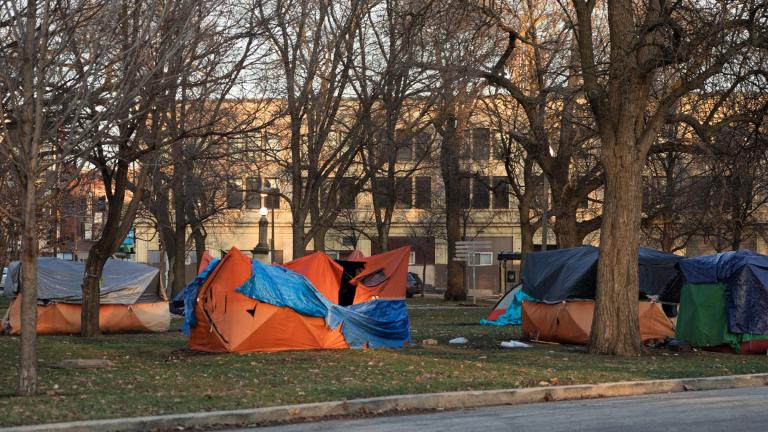 LaSalle Street in Chicago. (Michael Izquierdo / WTTW News)
LaSalle Street in Chicago. (Michael Izquierdo / WTTW News)
Mayor Brandon Johnson on Wednesday earmarked $151.2 million in taxpayer money to help subsidize four proposals to breathe new life into Chicago’s Financial District by transforming it into Chicago’s newest residential neighborhood, advancing a plan to “reimagine” Chicago’s Loop launched by former Mayor Lori Lightfoot.
The four proposals would invest a combined $520.2 million in the city’s central business district to build approximately 1,000 apartments in what is now mostly empty office space, including 300 units set aside for low- and moderate-income Chicagoans as part of an effort to reduce segregation in Chicago and chip away at the city’s shortage of affordable homes, officials said.
Three of the four projects selected by Lightfoot shortly after she lost her bid for reelection will head to the Chicago City Council for approval with the backing of Johnson, who threw his support behind an effort embraced by Chicago’s business community to chart a new future for LaSalle Street between Washington Street and Jackson Boulevard, an area of the city significantly changed by the shift triggered by the COVID-19 pandemic in how and where Chicagoans work and shop.
“Like many cities, we are in the process of recovering from the impact of the pandemic, resulting in vacancies, particularly our storefronts and offices,” Johnson said, announcing the plan in the lobby of 208 S. LaSalle St., one of the buildings set to be transformed. “Additionally, evolving conditions in workplaces and retail are changing what it means to be a shopper and a worker. We have to respond to these changes. As a city, we have to do it in a creative and collaborative way.”
Johnson’s full-throated endorsement of the plan comes at a tense moment in his relationship with Chicago’s business community, which overwhelmingly backed former Chicago Public Schools CEO Paul Vallas in the 2023 mayoral election.
A coalition of real estate and development groups recently sued to knock the Bring Chicago Home measure off the March 19 primary ballot, while campaigning vigorously against the measure they contend could cause the city’s already-struggling commercial real estate market to collapse amid the shift to remote work. If passed, the measure would have given City Council the power to hike taxes on the sales of properties worth $1 million or more to fight homelessness.
In addition, Alds. Brendan Reilly (42nd Ward) and Bill Conway (34th Ward) repeatedly said they were worried that Johnson would scrap the plan to rethink the financial district. Although both are frequent critics of the mayor, they attended Wednesday’s announcement — but were not seated on the dais alongside the mayor.
After the announcement, Johnson told reporters the conventional wisdom that his administration is hostile to Chicago’s business community was false.
“I’m standing right here in the middle of the business district,” Johnson said. “Here you have hundreds of millions of dollars of investment for development and affordable housing.”
Johnson scoffed at the “notion that somehow there is some sort of disconnect between my administration and business.”
“The city of Chicago is open for business,” Johnson said. “We have not seen this type of execution in a generation in Chicago.”
Two additional proposals, at 135 S. LaSalle St. and 105 W. Adams St., are under consideration for additional subsidies, with Johnson telling the enthusiastic crowd to “stay tuned.” Lightfoot had picked the redevelopment at 135 S. LaSalle St. to advance.
In all, city officials received nine proposals in December 2022 not only to build new apartments where cubicle dwellers once worked but also to transform building lobbies into spaces for “cultural or entertainment purposes” and vacant storefronts into grocery stores and restaurants. One proposal was rejected, another application was withdrawn, and two others were deemed ineligible or incomplete, city records show.
City officials said their goal was to transform the Financial District into an area that is vital 24 hours a day, seven days a week — not just during the workweek, as it was before the COVID-19 pandemic.
The residential developments along LaSalle Street will be required to put aside 30% of their units for Chicagoans earning 60% or less of the area’s median income, which is $66,180 for a family of four, according to city data, in order to get millions of dollars in city subsidies from the downtown tax-increment financing, or TIF, district.
By law, TIF districts capture all growth in the property tax base in a designated area for a set period of time, usually 23 years or more, and divert all that growth into a special fund for projects designed to spur redevelopment or for public projects such as schools or bridges.
While the number of people living downtown has doubled since 2000, that growth has bypassed LaSalle Street, where many of the historic buildings were built during a bygone era and are beloved but little used historic landmarks.
In addition, there is essentially no affordable housing in the Loop, ensuring that only wealthy Chicagoans can live downtown.
The proposals advancing to the City Council for consideration are:
- 111 W. Monroe St., where Prime/Capri Interests, LLC wants to spend $203 million to build 345 apartments, including 105 affordable units, as part of a development that would include a 228-room hotel. The project has requested a $40 million subsidy.
- 208 S. LaSalle St., where the Prime Group wants to spend $123 million to build 226 apartments, including 84 affordable units, sandwiched between two hotels. The project has requested a $26.2 million subsidy.
- 30 N. LaSalle St., where Golub & Co. wants to spend $130 million to create 349 units, with 105 affordable. The original proposal included ground-floor retail, as well as green space and seating on streets bordering the property. The project has requested a $57 million subsidy.
- 79 W. Monroe St., where the Campari Group wants to spend $64.2 million to build 117 apartments, including 41 affordable units. The project has requested a $28 million subsidy, which also calls for the restoration of the color-changing “Weather Bell” sign that signals temperature changes.
Contact Heather Cherone: @HeatherCherone | (773) 569-1863 | [email protected]








